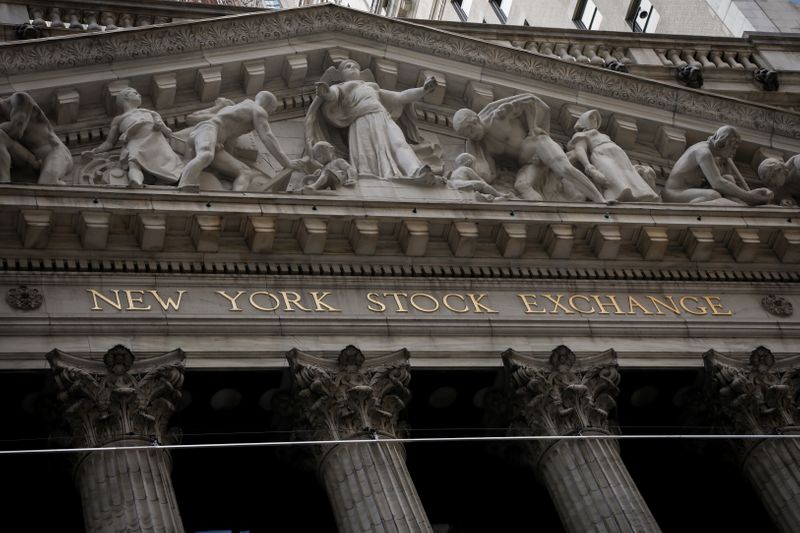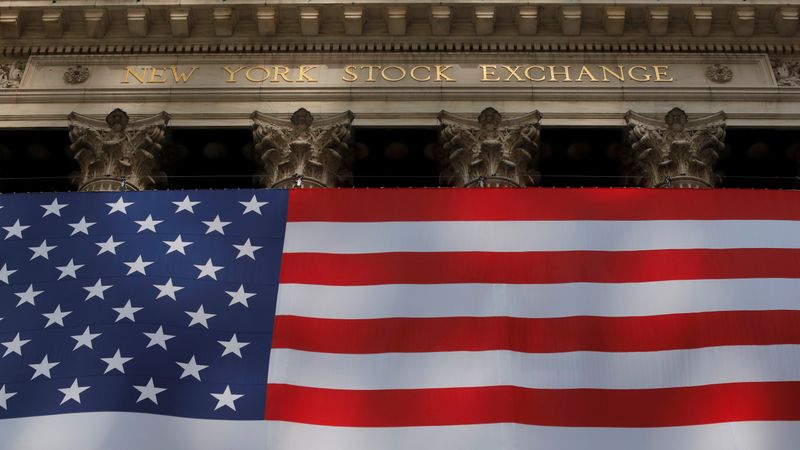By Medha Singh and Shivani Kumaresan
(Reuters) - Wall Street's main indexes fell on Wednesday as Treasury Secretary Steven Mnuchin said it was difficult that a deal on more fiscal stimulus would be reached before the presidential election in November.
The downbeat comments added to the fragile sentiment following a mixed bag of quarterly earnings reports from major Wall Street lenders.
"At this point getting something done before the election and executing on that would be difficult just given where we are and the level of detail, but we're going to try to continue to work through these issues," Mnuchin said at a conference sponsored by the Milken Institute.
U.S. House of Representatives Speaker Nancy Pelosi and Mnuchin had a productive discussion about relief proposals, but the administration's lack of a national strategic testing plan remained a "major area of disagreement", a Pelosi spokesman said. They will speak again on Thursday, he added.
"The market is a little worried about not having that extra support for the next couple of months into the holidays," said Thomas Hayes, chairman at Great Hill Capital LLC in New York.
"This was viewed as a bridge to a full therapeutic or a vaccine (but) everything is getting delayed and without the stimulus, there's not that short-term bridge that we needed to get to the vaccine, to get us to the finish line."
Fading hopes of a deal on federal aid, as well as a halt in trials of a COVID-19 vaccine and a treatment have pulled the three main stock indexes back from one-month highs, but investors have held out for stimulus after the Nov. 3 presidential election.
At 12:50 p.m. ET, the Dow Jones Industrial Average was down 0.53%, the S&P 500 was down 0.69% and the Nasdaq Composite was down 0.97%.
Goldman Sachs (NYSE:GS) edged up as strength in its trading business helped quarterly profit surge 94%, but Bank of America (NYSE:BAC) and Wells Fargo (NYSE:WFC) shed 4.0% and 5.4%, respectively, after a disappointing showing.
The S&P 500 banks index dropped 1.4% as the third-quarter earnings season took off amid improving expectations over the extent of the drop in overall profits for S&P 500 firms.
Analysts now expect earnings to fall 18.9% from a year earlier, according to Refinitiv IBES data, versus a 25% drop forecast on July 1.
Markets have also begun to digest the prospect of a Democratic victory, strategists and fund managers said.
While many investors view Democratic candidate Joe Biden as more likely to raise taxes, they are increasingly pointing to potential benefits of a Biden presidency, such as greater infrastructure spending and less global trade uncertainty.
Energy stocks rose the most among major S&P sectors on the back of a rise in oil prices. [O/R]
UnitedHealth Group Inc (NYSE:UNH) dropped 2.8% despite raising its profit forecast as the U.S. insurer said it was difficult to predict the fallout of the COVID-19 pandemic on earnings.
Declining issues outnumbered advancers 1.18-to-1 on the NYSE and 1.60-to-1 on the Nasdaq.

The S&P index recorded 22 new 52-week highs and no new low, while the Nasdaq recorded 100 new highs and nine new lows.
